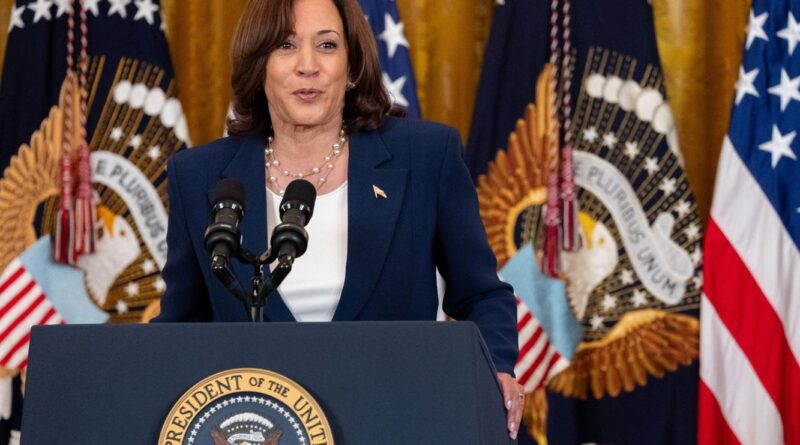How the Future Harris Administration Could Expand Medicare’s Drug Price Limits
WASHINGTON DC: Vice President Kamala Harris speaks at a White House event in August 2023 to celebrate … [+]
Standing next to President Biden at a campaign event last month, Democratic candidate for President, Kamala Harris, celebrated the recently announced price reductions for the top ten prescription drugs Medicare negotiated under ‘a provision in the Price Reduction Act. Harris said he is “proud to have passed a blanket vote that gave Medicare the power to negotiate” drug prices. And now he has confirmed his commitment to expand the implementation of legal elements in the field of commercial insurance and to build a Medicare negotiation policy to include more drugs if he becomes President. However, he could not achieve these goals alone. He would need Congressional support.
The Department of Health and Human Services last month announced the lowest prices—so-called maximum prices—Medicare negotiated with drugmakers for the first ten drugs it selected in 2023 under IRA drug price negotiation program. These outpatient drugs are well-known, top-selling drugs, also among the elderly and the disabled. They are used to treat diseases such as heart disease, diabetes and cancer. The new prices will go into effect on January 1, 2026. Once these prices are implemented, Medicare providers are expected to save a total of $1.5 billion in out-of-pocket drug costs.
The next batch of 15 outpatient drugs will be selected by the Centers for Medicare and Medicaid Services in February 2025; their MFPs will be used in 2027. And the next cycle will include a total of 15 patient and prescription drugs, which will be selected in February 2026 and MFPs used in 2028. Starting in 2027 , the number of selected drugs-a combination of drugs prescribed by doctors and physicians-can reach 20 annually if sufficient numbers meet the selection criteria.
Another major IRA provision designed to lower the burden of out-of-pocket costs for Medicare beneficiaries is a general amendment to the outpatient pharmacy benefit called Part D, which previously asked for the cost of annual recipient to $3,300 in 2024 and will decrease further. cap at $2,000 by 2025. At the same time, Part D reform would shift the cost burden for high-cost beneficiaries away from the federal government and toward managed pharmacy benefit plans and specialty drug manufacturers.
Other important measures implemented in the IRA include a $35 per month out-of-pocket cost for insulin products for all Medicare beneficiaries. This went into effect in 2023. And the law provides free vaccinations for seniors and people with disabilities starting in 2024.
Looking ahead, Harris has pledged to expand the commercial insurance sector’s $2,000 copay for prescription drugs and out-of-pocket insulin costs of $35 a month.
Harris also wants to expand the scope of Medicare drug price negotiations, following what the White House outlined earlier this year when it wanted to significantly increase the number of drugs subject to Medicare price negotiations to to 50 per year, from 20, starting in 2028. The financial plan presented by the White House will build on the IRA, which currently enables Medicare to negotiate 140 prices in total by 2033.
Increasing the number of drugs eligible for price negotiations will be achieved by allowing the Medicare selection of drugs to happen quickly, that is, as soon as five years after the drug’s approval by the Food and Drug Administration. Small molecule drugs are currently not eligible for review for seven years after approval, while biologic or large molecule drugs only have a 11 year period.
Both the expansion of some out-of-pocket provisions to the commercial sector and the expansion of Medicare drug price negotiations will require Congressional support. They cannot be made under the existing authority provided by the IRA. Harris would require Congress to pass an amendment to the law or create a separate piece of legislation.
The likelihood of Congressional action depends of course on the results of the elections in the House and Senate. And even if Democrats were to win a majority (at least) in the House and maintain their slim edge in the Senate, it’s far from clear that there will be enough political support for the kinds of changes Harris has called for. in an IRA. .
As a reminder of how difficult the IRA as currently constituted was, a minority of moderate House Democrats raised concerns in 2021 about allowing Medicare to negotiate drug prices. In the previous edition of the IRA called Build Back Better, they voted against such negotiations which would have included a total of 250 medicines until 2032. In the end an agreement was reached in which most of the 140 which will be subject to negotiation.
So while Harris has been campaigning on some of the current Administration’s achievements, particularly on reducing the burden of out-of-pocket costs for Medicare beneficiaries, despite being elected his desire for an expansion of price measures of IRA drugs can block obstructions in Congress.
#Future #Harris #Administration #Expand #Medicares #Drug #Price #Limits
